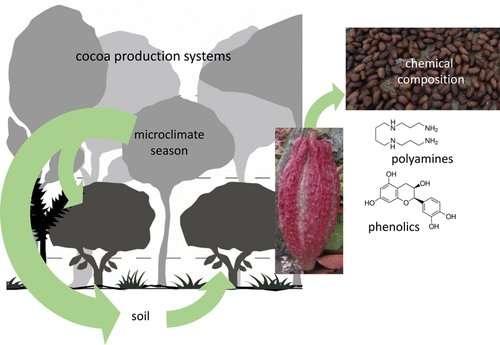'Stressed out' cocoa trees could produce more flavorful chocolate

Most people agree that chocolate tastes great, but is there a way to make it taste even better? Perhaps, according to scientists who looked at different conditions that can put a strain on cocoa trees. Reporting in ACS' Journal of Agricultural and Food Chemistry, they say that although the agricultural method used to grow cocoa trees doesn't matter that much, the specific weather conditions do.
Cocoa trees grow in hot and humid climates near the equator. Traditionally, these trees are raised together in mixed groves with other types of trees and plants that can cool the air and provide vital shade. The system, called agroforestry, provides a low-stress environment, increases nutrients in the soil and helps maintain ground water levels. But to gain higher yields, growers sometimes plant cocoa trees in solitary, "monocultural," groves, in which the trees are exposed to stressful conditions. In response to the stress, trees produce antioxidants that can potentially counteract the damage, but these compounds also could change the quality characteristics of the beans. Wiebke Niether, Gerhard Gerold and colleagues from FiBL (Switzerland) wanted to find out whether differing growing methods can influence the chemical composition, and potentially the flavor, of cocoa beans.
The researchers harvested beans from five cocoa tree farms in Bolivia at the beginning and end of the dry season, which runs from April to September. The trees were raised in full-sun monocultural groves or in agroforest settings. The beans were fermented and dried, then analyzed. The research team detected only minor differences in the chemical composition among the beans harvested from the farms during the same weather conditions. Slightly more phenols and other antioxidant compounds were detected in beans taken from monoculturally grown trees than those that came from trees grown with agroforest methods, but the differences were not significant, according to the researchers. The larger contribution to chemical composition was the weather. Overall, the antioxidant content increased and fat content of the beans decreased during the dry season as temperatures rose and soil moisture dropped. The researchers say these differences could contribute to variability in cocoa bean flavor.
More information: Wiebke Niether et al. Environmental Growing Conditions in Five Production Systems Induce Stress Response and Affect Chemical Composition of Cocoa (Theobroma cacao L.) Beans, Journal of Agricultural and Food Chemistry (2017). DOI: 10.1021/acs.jafc.7b04490
Abstract
Cocoa beans are produced all across the humid tropics under different environmental conditions provided by the region but also by the season and the type of production system. Agroforestry systems compared to monocultures buffer climate extremes and therefore provide a less stressful environment for the understory cocoa, especially under seasonally varying conditions. We measured the element concentration as well as abiotic stress indicators (polyamines and total phenolic content) in beans derived from five different production systems comparing monocultures and agroforestry systems and from two harvesting seasons. Concentrations of N, Mg, S, Fe, Mn, Na, and Zn were higher in beans produced in agroforestry systems with high stem density and leaf area index. In the dry season, the N, Fe, and Cu concentration of the beans increased. The total phenolic content increased with proceeding of the dry season while other abiotic stress indicators like spermine decreased, implying an effect of the water availability on the chemical composition of the beans. Agroforestry systems did not buffer the variability of stress indicators over the seasons compared to monocultures. The effect of environmental growing conditions on bean chemical composition was not strong but can contribute to variations in cocoa bean quality.
Journal information: Journal of Agricultural and Food Chemistry
Provided by American Chemical Society



















